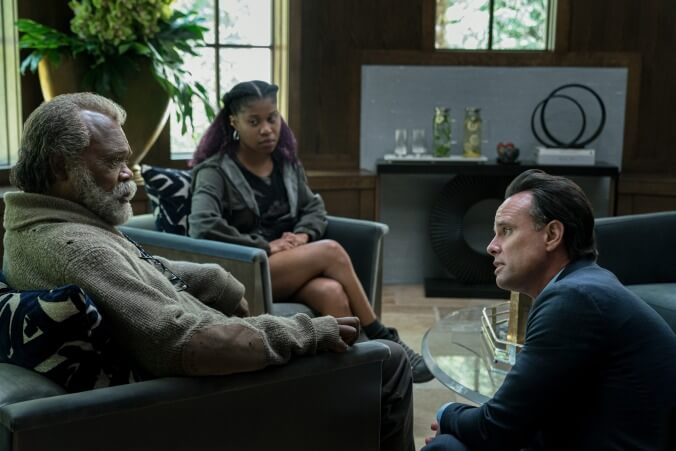All the Samuel L. Jacksons show up in the elegiac The Last Days Of Ptolemy Grey
The iconic actor flexes plenty in this Apple TV+ miniseries based on Walter Mosley's novel

Not to diminish such a triumphant filmography, but you could say there are two Samuel L. Jacksons. One is the stone-cold badass who has dispensed wisecracks and justice in equal measure since Pulp Fiction: as slick vigilante John Shaft and Marvel Cinematic Universe wrangler Nick Fury, to name two. Then there’s Jackson as the older, vulnerable everyman, full of frailty and doubt, in artier projects such as Black Snake Moan, The Sunset Limited, and Django Unchained. The neat thing about the Apple TV+ miniseries The Last Days Of Ptolemy Grey? We get both Jacksons.
Based on the 2010 novel by the prolific Walter Mosley (who created, co-wrote, and executive produced the series with Jackson), Ptolemy Grey braids a few genres with style and humor to showcase its star’s range. We have a family-of-choice drama, an experimental-medical thriller, a murder mystery (this is the author of Devil In A Blue Dress, after all), and a period tragedy from the Jim Crow South, all rolled into one. And judging from the three episodes available for review, there’s plenty of backstory to fuel six hours.
First and foremost, Ptolemy Grey is a lovingly etched portrait of a man at the mercy of memory, dodging shards from the past lodged in the present. Hair wild and unkempt, beard a grizzled mass, those big, brown eyes bugging with panic, Jackson’s 91-year-old Ptolemy cuts a desperate figure at first, an elderly recluse practically buried under towers of books, newspapers, and ephemera hoarded in his Atlanta apartment. Living off cans of beans and staring at the TV news as classical radio burbles away, Ptolemy cannot keep out the PTSD-like flashbacks from 1930s Mississippi: a person on fire, screaming as he runs into a cornfield; a house engulfed in flames; a man named Coydog (Damon Gupton) who insists that young Ptolemy fulfill an unnamed promise. Apart from these guest specters, Ptolemy is forgotten.
Well, not entirely. Ptolemy gets a visit from his kindly grandnephew Reggie (Omar Miller), the closest thing he has to a caregiver. (There’s no way to write about this the setup without throwing in a few spoilers, so be warned.) Reggie coaxes his confused, forgetful relative out to the doctor and the diner and makes an appointment for a radical new treatment that could help Ptolemy recover his deteriorating memory. Before Reggie can take Ptolemy to the consultation, however, he’s killed in a drive-by shooting. Our hero learns of Reggie’s death in a beautifully calibrated sequence at the end of the first episode, as he attends a gathering at the home of his grandniece Niecie (Marsha Stephanie Blake), and the reality of the occasion finally dawns on him.
By the second episode, Reggie’s space is filled by Robyn (an excellent Dominique Fishback), the orphaned teen daughter of a friend of Niecie’s. Robyn gets kicked out of Niecie’s home after the latter’s deceitful son, Hilly (DeRon Horton), tries to assault the girl. Robyn moves in with Ptolemy, despite the filthy state of the apartment. Skeptical and prickly, Robyn becomes both mother and great-granddaughter to the old man, cleaning out his place and getting him to that appointment made by Reggie.
When Ptolemy finally agrees to the treatment offered by the soft-spoken and overly solicitous Dr. Rubin (Walton Goggins, dialing back the hysterics of his Danny McBride collaborations), the plot starts shifting into gear. The exact nature of the serum Rubin injects into Ptolemy is never adequately explained, but within hours he has become cogent and lucid, remembering details of the day and years past. Two more (painful) jabs later, and Ptolemy shaves his beard, slips into his slickest ’70s suit, and determines to solve the mystery of Reggie’s murder.
There’s a lot stuffed into Last Days—flashbacks to Ptolemy’s tempestuous second marriage to the troubled Sensia (Cynthia Kaye McWilliams), mordant commentary on Black Americans’ wary relationship to white doctors, the epigenetic trauma of racism—and yet the storytelling can feel leisurely. It’s a slow burn as Mosley establishes Ptolemy’s world and allies, and sprinkles clues about a treasure Coydog steals from white sharecropper bosses. By the end of the third episode, you’re almost urging the creative team to hit the gas pedal.
At the same time, it’s a joy to see Jackson taking a break from the high-metabolism MCU to disappear inside wigs and latex as doddering Ptolemy, snap into focus as a medicated Ptolemy, and even tackle the man in his prime years. Jackson fans have plenty to feast on as he uses every tool in his bag: the caustic wit, boyish petulance, swagger, heroic resolve. All in all, this is Jackson’s richest, most layered performance since Tarantino’s underrated The Hateful Eight.
For Mosley, too, it’s a benchmark project. In 2019, the novelist very publicly quit Star Trek: Discovery over racially explicit language he used in the writer’s room, so it’s noteworthy to see him in the driver’s seat, mining his own material. (Mosley’s beloved Easy Rawlins books are also being adapted for a new series by Amblin Television.)
Truth is, neither Mosley nor Jackson has anything to prove at this point in their careers, but they’re still dedicated to gritty Black stories as popular entertainment, mixing pulp devices and historical honesty about racism in America. Their memories are working just fine, no wonder drugs needed.